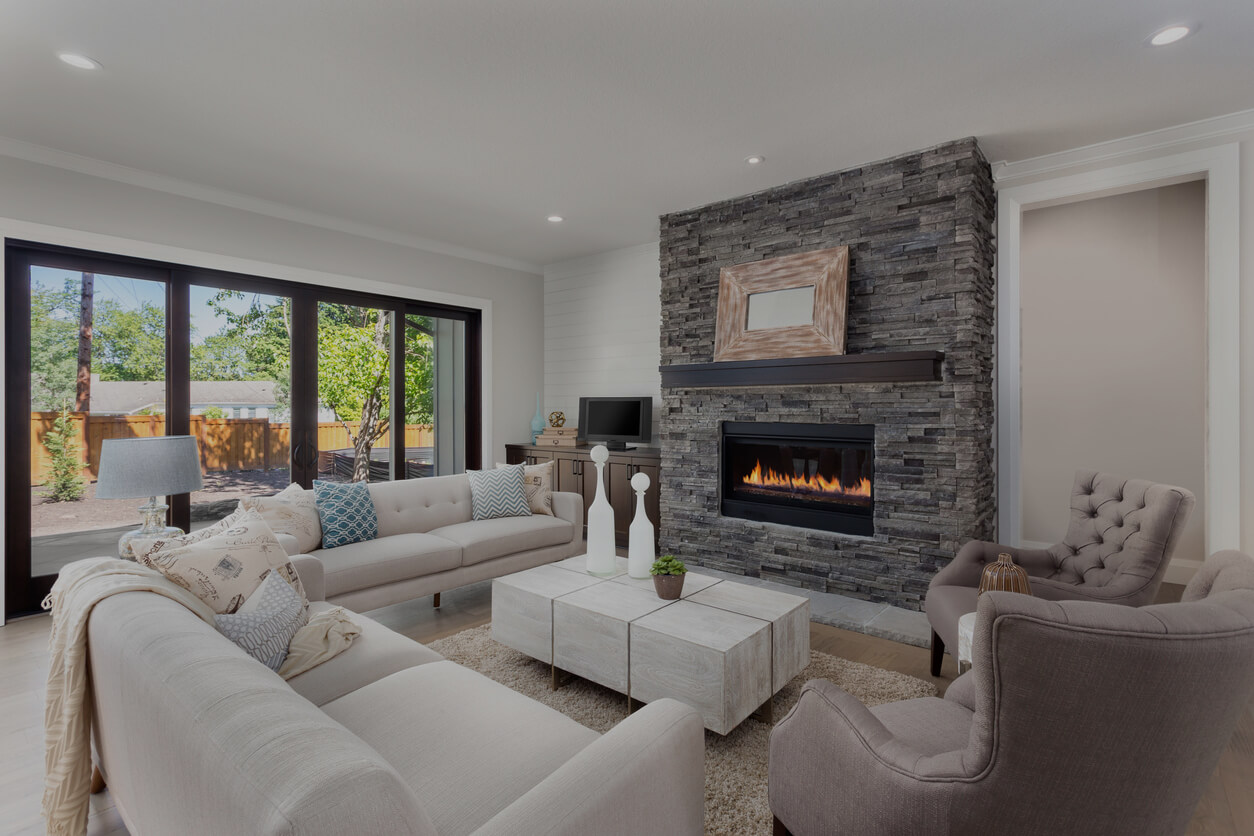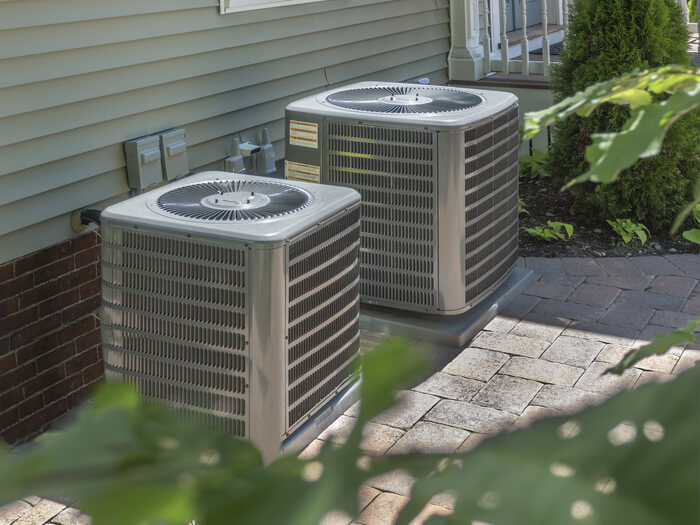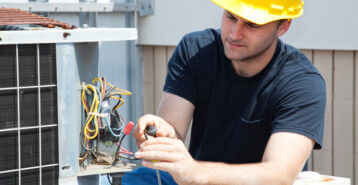- How Much Does a New HVAC System Cost?
- Average Cost of a HVAC Replacement in 2026
- HVAC Replacement Cost by Unit Type
- What Factors Affect HVAC Replacement Cost?
- Additional HVAC Installation Costs
- How To Calculate HVAC Installation Cost?
- Should You Repair or Replace Your HVAC System?
- Benefits of a New HVAC System
- DIY HVAC Installation vs Hiring a Pro
- How to Find the Right HVAC Professional?
- Frequently Asked Questions
How Much Does a New HVAC System Cost?
The average cost to replace an HVAC system ranges from $11,590 to $14,100 as of 2026. This is based on 56,000 real homeowner projects over the past 6 months with Modernize, and includes central air conditioning, furnace, and heat pump replacement plus labor costs. HVAC replacement cost depends on your home’s size, the system type, and installation requirements. Ductwork replacement for a 2,000 sq. ft. home, in addition to the HVAC replacement, adds about $2,100 to $4,000. Use our HVAC cost calculator above to estimate your price for a new system.
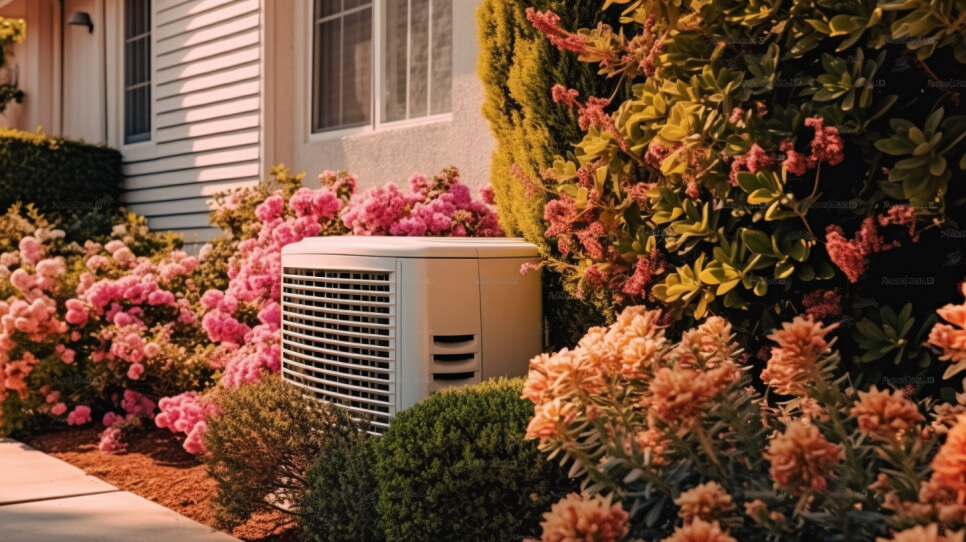
Average Cost of a HVAC Replacement in 2026
For a 2,000 to 2,500 square foot home, the average cost of a new HVAC system is about $13,430 for a combined air conditioning and gas furnace setup. This combination is the most common type of HVAC system found in homes across the U.S.
In areas with low labor costs, an HVAC replacement for a home under 1,500 sq. ft. could cost as little as $5,000. For a home more than 3,000 sq. ft. in a higher cost-of-living area, a new AC and furnace could cost more than $20,000.
For a home of 1,500 square feet (or smaller) in a low labor-cost area, a full HVAC replacement could start around $5,000, depending on the system type and installation requirements. In higher cost-of-living areas, an AC and furnace for a home more than 3,000 square feet could cost more than $20,000.
Average HVAC System Costs by Home Size
| Home Size (Square Feet) | HVAC System Only (AC + Furnace/Heat Pump) | HVAC System With Ductwork |
|---|---|---|
| 1,000 | $4,500 to $7,500 | $6,600 to $11,500 |
| 1,500 | $5,000 to $8,500 | $7,100 to $12,500 |
| 2,000 | About $13,430 | $15,500 to $17,400 |
| 2,500 | About $13,430 | $15,500 to $17,400 |
| 3,000 | $15,000 to $20,000+ | $17,100 to $23,000+ |
Notes:
-
Ductwork costs typically add $2,100 to $4,000 for a standard installation in a 2,000-square-foot home. Larger homes scale higher.
-
Actual costs vary based on system efficiency, equipment brand, local labor rates, and whether the home has existing ductwork that can be reused.
Material costs aren’t always predictable, and tariffs are one factor that can drive prices higher. While not all materials are affected, tariffs can lead to noticeable price changes in home renovation projects. If you’re budgeting for a home project, Modernize recommends asking your contractor if recent tariffs will impact your project’s material costs.
HVAC Replacement Cost by Unit Type
As we noted above, our average estimates assume you are replacing the most common system type, which is an AC unit with a gas furnace. However, there are many types of HVAC systems. Let’s take a look at HVAC replacement costs for each unit type, and then we will walk through what each does.
| HVAC Unit Installation Costs | Low Cost | High Cost |
|---|---|---|
| Central Air Conditioner | $6,465 | $11,877 |
| Ductless Split AC | $2,142 | $3,936 |
| Electric Furnace | $767 | $3,523 |
| Gas Furnace | $956 | $3,870 |
| Oil Furnaces | $3,325 | $8,222 |
| Heat Pump | $2,905 | $7,449 |
| Geothermal Heat Pumps | $15,000 | $38,000 |
Central Air Conditioning/AC
A central AC unit is connected to your home’s ductwork and uses forced air to cool down the home’s temperature. It is typically paired with a heating system like a furnace. A central AC system includes a condenser, a compressor, and an evaporator. Costs for both the system and the labor to install it range from $6,465 to $11,877. You can visit our central AC installation guide for more information.
Window AC
Unlike central air, which cools your entire home, a window AC unit is installed in one room and is responsible for cooling that room only. Window AC units are most commonly used in bedrooms in homes that do not have ductwork or in homes that only need cooling for a short period of time each year. They range in price from about $150 for units for small rooms to $600 for units for large rooms. Our guide to AC window unit costs can tell you more.
Ductless Split AC
Also called a mini-split, these cooling systems are excellent for homes without ductwork. A mini-split unit is mounted on the wall in each room you want cooled and then connected to a compressor outside your home. They are simpler to install than a central AC system. The average cost of a ductless split AC system ranges from $2,142 to $3,936. You can learn more about mini-split AC units by reading our guide.
Gas Furnace
Gas furnaces are the most common type of furnaces, and they are often combined with central AC. This is because, like central air conditioning, they are connected to your home’s ductwork and use forced air to heat it. Furnaces usually come with a blower to distribute the heated air throughout your home. A gas furnace can range in price from $956 to $3,870. We have more information on gas furnace installation cost and how to choose one available over at our buying guide.
Oil Furnace
Oil furnaces work much like gas ones, but they tend to be popular in the northeast region of the U.S. where temperatures remain cold for longer. They are quieter and cheaper to run than gas furnaces and can also run only on oil or as a hybrid system that uses a heat pump to also provide cooling. However, they cost more upfront than gas furnaces, with an average price range of $3,325 to $8,222. You can learn more about oil furnace costs and considerations by reading our guide.
Electric Furnace
An electric furnace is perfect for homeowners without a natural gas line, any eco-conscious homeowners, or any homeowner who would have cheaper monthly utility bills using electric instead of gas. Installing or replacing an electric furnace is a simpler (and thus cheaper) process with a gas one since they don’t have to be vented. They are also much quieter than gas furnaces. Average costs to buy and install an electric furnace range from $767 to $3,523. Our guide to electric furnace costs covers this furnace type in more detail.
Heat Pump
Heat pump systems are an energy-efficient alternative to an AC/furnace combo. When looking at HVAC replacement costs for heat pumps, there are three types to choose, with the least expensive ranging from $2,799 to $7,449 to install and the most expensive (a geothermal heat pump) costing upwards of $20,000. Learn all about all the types of heat pumps and their costs by visiting our guide.
Boiler
Like furnaces, boilers can be electric-, gas-, or oil-powered. However, instead of using forced air the way a furnace does, a boiler uses either hot water or steam. That water/steam then travels through pipes connected to radiators throughout the home. Boilers start at around $4,000, and depending on the size and type you choose, can cost upwards of $11,000. Our guide to boiler costs and installation can tell you everything you need to know.
Radiator
Radiators are used in conjunction with boilers (see above) to heat homes. There are four kinds of radiators you can choose from for both your home aesthetics as well as for how you want your heat distributed: cast iron radiators, baseboard radiators, column radiators, and panel radiators. You can find out more about each by reading our guide to radiators.
There are even more HVAC system types you can explore. Check out our buying guide to types of HVAC systems to see all your options.
What Factors Affect HVAC Replacement Cost?
HVAC installation costs can vary depending on a few factors that are specific to your home and location. Here are the main things that your professional air conditioning contractor will assess in order to give you a total price quote for your replacement HVAC system:
- Local climate conditions
- Current ductwork conditions
- Home age and construction
- HVAC unit features, such as size, brand, and energy efficiency (SEER)
- Top air conditioner brands and associated installation costs
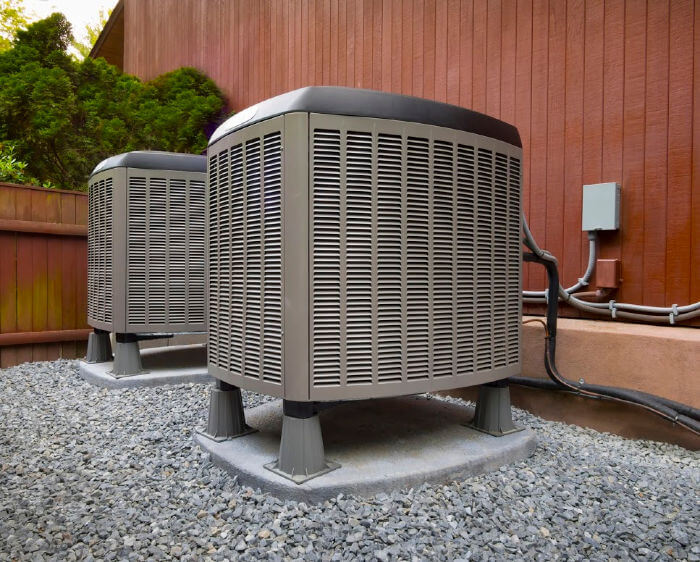
Local Climate Conditions
Do You Need Ductwork Replacement?
Home Age and Construction
Your home’s size and insulation affect how efficiently it can be cooled and heated. As you might expect, a 3,000 square foot home will need a much larger AC unit than a 1,500 square foot home, which will impact installation costs. However, older windows and insulation can mean your unit needs to be larger, too. A house with energy efficient windows that are well insulated and sealed with no cracks for air flow will require far less AC capacity to keep temperatures comfortable.
Other factors that can affect your system size include the insulation in the foundation, roof, attics, basements, flooring, and more.
HVAC Unit Size
As you’ve been reading above, the size unit you need will have a large impact on your project cost. Homes that are larger, home that are more likely to use their heating/cooling systems daily (or nearly daily) because of the climate, or homes that have older insulation and windows will need to budget more for a larger unit size.
See the chart below for the average central air conditioner replacement cost by tons to get a sense of how prices can change based on system size.
| Central Air Conditioner Size | AC Unit BTU | AC Unit Only |
|---|---|---|
| 1.5 Tons | 18,000 BTU | $1,986 |
| 2 Tons | 24,000 BTU | $2,117 |
| 2.5 Tons | 30000 BTU | $2,352 |
| 3 Tons | 36000 BTU | $2,920 |
| 3.5 Tons | 42000 BTU | $3,550 |
| 4 Tons | 48000 BTU | $3,650 |
| 5 Tons | 60000 BTU | $3,690 |
Don’t know what size unit you need? You can use our furnace size calculator and our AC size calculator to find out.
Brand
The HVAC brand you choose will impact total installation costs. You can check out our picks for best AC brands, best furnace brands, and best heat pump brands to get familiar with the bigger names on the market.
Higher end central AC units will cost more upfront. However, better brands usually come with a longer lifespan and ROI, better warranties, and smarter technology built in to fully control your home’s temperature. You can read all about how to calculate the ROI of your HVAC replacement over on our blog.
Energy Efficiency
A trusted HVAC professional can help you decide which features your home needs. Higher priced HVAC systems will come with higher energy efficiency levels, also known as the SEER rating. Where you live, the system type you want, and the size of your home will all impact your energy efficiency requirements.
Additional HVAC Installation Costs
There may also be some costs that are not included in the initial HVAC replacement estimate but that you’ll still want to consider. Ask your contractor if the following costs are included in the initial quote they provide:
- Permits: Is a permit required from your local city or county building department? Read this post on whether a permit is needed for an air conditioning replacement.
- Inspections: Does the unit also require an inspection by a representative of the building department to ensure the system is up to code?
- Labor Costs: Are there any potential labor or disposal costs involved? For instance, if you live in an older home that has asbestos or lead paint, there may be an additional cost to test, remove, or replace the material.
- Insulation: Do you need to replace or add any insulation to your home to ensure your unit works efficiently? If you are going to have an AC unit in the attic, should additional attic insulation be considered?
How To Calculate HVAC Installation Cost?
To calculate HVAC installation cost for your home, you need to consider the price of the HVAC unit and your local labor charges. Unit costs depend on your home’s square footage, the type of system you need, and its heating and cooling capacity. You should also factor in the cost of ductwork if your home requires it, along with project management expenses such as labor, transportation, and disposal.
How to Use This HVAC Cost Calculator
Our HVAC cost estimator provides a quick and tailored quote for your home. Simply input the following, and we’ll give you an immediate cost estimate, no email address or personal information needed!
- System type (heating, cooling, or both).
- Square footage of your home.
- ZIP Code for labor cost adjustments.
This tool considers labor, materials, and location-specific factors to give you an accurate price range.
Should You Repair or Replace Your HVAC System?
If your HVAC unit can be repaired, that will almost certainly be more cost-efficient than buying a new unit. So how do you know if the problem with your HVAC is able to be repaired? Plan to call a tech for a repair in these circumstances:
- If your pilot light won’t stay lit.
- Your unit has a leak.
- If the unit’s fan won’t stop running or if your system gets “stuck” in one mode.
- Your system is over 10 years old and has recurring issues.
- High utility bills suggest your system is not operating efficiently.
- Repair costs are approaching or exceeding 50% of replacement costs.
You can check out our blog post on why your HVAC system isn’t working for more information on when to call in the pros.
You may encounter a problem like your AC is running but not cooling or your furnace is running but not heating. If that’s the case, you might be able to repair it. Or, you might be looking at a situation where your system needs to be replaced. Also, we recommend replacing systems older than 10 years old if they’re having problems.
Benefits of a New HVAC System
Installing a new HVAC system comes with a set of benefits:
- Energy Savings: Modern units with ENERGY STAR ratings reduce utility bills.
- Improved Comfort: Enhanced temperature control and quieter operation.
- Higher Home Value: Increases market appeal and resale value.
DIY HVAC Installation vs Hiring a Pro
While there is some HVAC maintenance you can DIY, installing a new unit is best left to the pros. When a project requires work with electrical systems, plumbing, or gas lines, you should not attempt the job yourself. Installing an HVAC unit yourself is risky and can lead to mistakes that cause higher utility bills.
You can read our guide on what to expect during an HVAC replacement to learn more about installation details.
How to Find the Right HVAC Professional?
We advise you to get between three and four local price quotes from different qualified HVAC contractors in order to find the best professional and the best price for the replacement. Here are a few next steps you can take:
- Explore our page on all things HVAC to see brands, pricing, and more as you budget for your project.
- Start asking neighbors, friends, and family for recommendations on HVAC installers.
- Browse our contractor directory to see which pros are available in your area to provide free quotes for HVAC replacement costs.
If you’d like us to do the research for you, click below and answer a few questions about your project. We’ll match you with up to four pre-vetted contractors.
